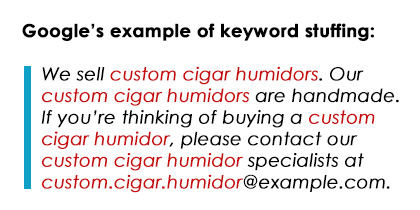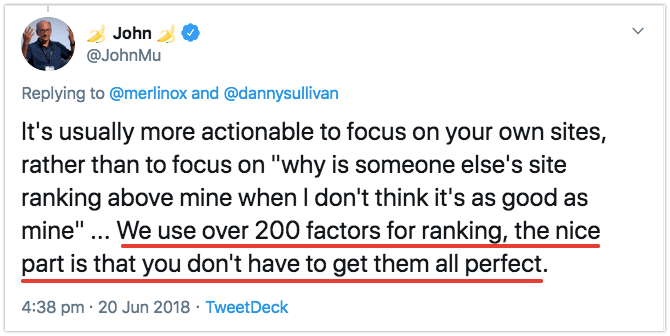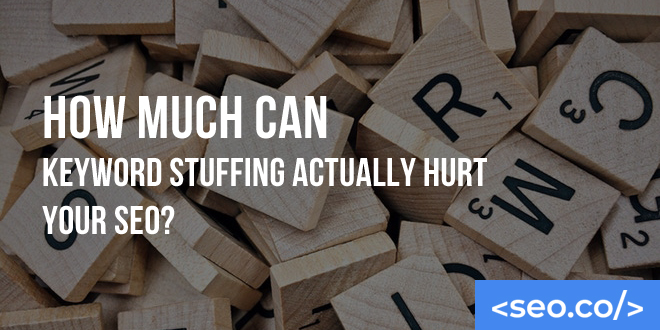99%+ of website shouldn’t even take stock in the idea that keyword stuffing will ever affect them.
Why?
Because we have tested thousands of sites and found that even sites with a keyword density of up to 12% can still rank VERY well in SERPs.
Do you know what a keyword density of 12% looks like?
It atrocious.
But, it still works.
The keyword stuffing that doesn’t work is when you shove your keywords in an invisible <div> tag.
That’s when you get in trouble.
Ask any professional SEO what they think of keyword stuffing as a strategy and they’ll tell you it’s obsolete, useless, or actively harmful for your brand.
But just how harmful is it?
What are the risks involved with keyword stuffing? Will search engines really punish you? Will your search rankings drop?
Table of Contents
What Qualifies as Keyword Stuffing

According to Google’s own definition, keyword stuffing is
…the practice of loading a webpage with keywords or numbers in an attempt to manipulate a site’s ranking in Google search results.
Google goes on to explain that these instances often appear in a list or group, in a context that makes no sense for them, or repeated an inappropriate number of times.
There is no hard parameter the number of times you use a keyword on a given page to qualify it as keyword stuffing. Because Google’s ranking algorithm works at least partially based on the context of various pages, it’s almost impossible to empirically tell. Instead, you’ll have to use your best judgment. If you read a keyword-containing phrase and it sounds “weird” or “off” to you, that’s a good indication that you’ve “stuffed” it into a place it doesn’t belong.
In order to make sure you’re are not keyword stuffing, we suggest you check out our guide to keyword density in SEO.
Keyword Stuff Has Been Dead for a Long Time
To understand why keyword stuffing is harmful in the first place, you have to understand the world of semantic search, which boils down to two important Google updates. The depth of keyword research, length of material, subject of material, detail, wording, and accuracy are all taken into consideration (among other factors). Sites with “fluff” content or content that isn’t relevant or useful are penalized, while sites with more valuable, well-written content are rewarded. Keyword-stuffed content naturally reads as unnatural and non-useful, making it rank lower than its contemporaries.

How Keyword Stuffing Hurts You
Now that you know what keyword stuffing is and why it can hurt you, we can take a look at exactly how keyword stuffing can hurt you. I’ve already mentioned that it can lower the rank for the page or site in question, but how much?
- Direct penalties. You won’t be blacklisted for stuffing a few keywords onto a page, but your content quality will be graded against how naturally written and useful it is. The more you keyword stuff, the lower quality content you’ll be deemed to have, and the lower your ranks will sink—eventually to the bottom.
- User experience factors. Keyword stuffing isn’t just bad for Google’s crawlers. If a user reads content on your site stuffed with keywords, they’ll end up with a bad impression of your brand. That’s potentially lost business even if you manage to attract traffic.
- Lost potential. Inbound links are a necessity for building rank, but people only link to valuable content. If yours is keyword-stuffed, you won’t be able to build the backlinks, and your progress will stagnate.
When combined, these effects of keyword stuffing have a cumulatively devastating effect on the ranking of your website. You won’t end up on Google’s blacklist, and a few simple content edits should be enough to reverse your momentum, but keyword stuffing will still stifle your progress almost completely for as long as you continue to abuse it.
Why Keywords Are Still Valuable
With all that said, “keywords” as a concept are still valuable—they’ve just evolved as a form of understanding your users. Rather than selecting a handful of specifically phrased keywords to hammer into your content at every turn, in the modern world, you’ll want to find subjects that your average user might like to read about or search for, and build content topics around those subjects. If you’re sufficiently detailed, and you focus on answering user questions completely, you’ll naturally use the type of language Google wants to see in its evaluative processes, and you’ll naturally rank for those queries.
It’s also important to use keyword identifiers for your brand and company in the page titles of your site, so Google understands who you are—the trick is to avoid too much repetition or any situation that might make a user grimace. Again, if it sounds like something a person would say naturally in a conversation, you’re probably in the clear.
Doesn’t SEO manipulate rankings?
While it’s not advised to manipulate search rankings, that’s a fine line to walk with SEO because the purpose of optimizing your website and content is literally to get your web pages ranking higher in the search engine results pages. To increase your page’s ranking, you’ll need to do things that look like they’re designed to manipulate rankings. However, when you use keywords appropriately with informative content, it’s not technically manipulation. What you need to do is focus on providing value to your visitors and you’ll find the sweet spot for keyword optimization.
When you create rich content that uses keywords properly, even when you stuff keywords into your content, you’re not creating a negative user experience. Informative content that utilizes specific phrases doesn’t count as keyword stuffing.
Genuine keyword stuffing, on the other hand, does create a negative user experience. Filling pages with keywords just to get on the first page of the SERPs will annoy your visitors and reputable sites don’t use this practice. In the early days, this was the norm, but search engines wised up to this practice and while keywords are still important, you can’t rank a site by keywords alone. You must use keywords appropriately because there’s another factor that goes into ranking: latent semantic indexing (LSI).
Focus on LSI keywords
You might be wondering if there’s an alternative to keyword stuffing. In other words, you know keywords are valuable, and they need to be inserted into your content, but how do you do that without stuffing? The answer is by using latent semantic indexing, or LSI.
LSI keywords are words that are generally related to your primary keyword and secondary keywords. For instance, say your primary keyword is “lawyers in Boston.” Your secondary keywords might be “attorneys in Boston,” or “legal representation in Boston.” When it comes to LSI keywords, your terms will be more general, like “criminal lawyers,” “how to handle a DUI,” or “suing for lost wages.”
Notice that the LSI keywords are far more general than your primary and secondary keywords. In this example, they branch off into diverse areas of law. However, LSI keywords are how Google and other search engines pick up on the context of your content and determine its relevance when a user searches for relevant terms. If you don’t have enough LSI keywords in your content, search engines won’t pick up on the nuances of your content.
Filling pages with LSI keywords in order to manipulate search rankings is a form of keyword stuffing. Remember to use all keywords appropriately, including LSI phrases. If you start ranking in the search results for too many keywords that miss the point of your content, you’ll see a rise in traffic, but a dip in conversions along with a high bounce rate.
When you publish information rich content, you have a better chance at automatically and naturally including LSI keywords. The more in detail you go, the more likely you are to include related terms.
If you want to avoid keyword stuffing, take your primary keyword and think of as many related topics as possible. However, don’t include topics that aren’t actually important to your business. If you use too many keywords that aren’t relevant to your services, you could end up ranking for search terms that will bring you useless traffic that doesn’t convert. To keep your search rankings relevant, make sure your keyword optimization efforts result in using relevant terms.
You don’t need keyword stuffing to succeed with SEO
If keyword stuffing is dead, how do you increase a page’s ranking using keywords? Well, first of all, you need to publish content that uses keywords intentionally. They should be naturally integrated into rich content that uses the keywords to provide value to the reader. If you need more keywords, choose them based on relevance and avoid keyword stuffing.
Once you have web content that provides value to your visitors, and you’ve found the sweet spot for keyword density, you can move along with the rest of your SEO optimization plan. For instance, good meta descriptions can go a long way to get you more clicks once you rank in the search results.
First page results will never be achieved by keyword stuffing. It’s not just Google. Other search engines look down on black hat tactics like hidden keywords and using keywords just for filling pages with content to force a page’s raking upward.
The Bottom Line
Keyword stuffing is a dead strategy—not just because Google has told webmasters to stop doing it, but because it genuinely detracts from your overall user experience. You’ll lose ranks, audience loyalty, and potential all at once, so don’t think you can cheat the system by stuffing keywords in a smart or clever way. There isn’t one. Instead, focus on writing the best natural, informative, detailed content you can, and focus on user needs instead of the exact phrasing they use in searches.
Tim holds expertise in building and scaling sales operations, helping companies increase revenue efficiency and drive growth from websites and sales teams.
When he's not working, Tim enjoys playing a few rounds of disc golf, running, and spending time with his wife and family on the beach...preferably in Hawaii.
Over the years he's written for publications like Forbes, Entrepreneur, Marketing Land, Search Engine Journal, ReadWrite and other highly respected online publications. Connect with Tim on Linkedin & Twitter.
- SEO for Labor and Employment Lawyers: Top Tactics to Rank - October 4, 2024
- How to Find & Fix Duplicate Content on Your Website - September 24, 2024
- SEO for Tax Lawyers: Local & National Lead Generation for Tax Attorneys - September 18, 2024



